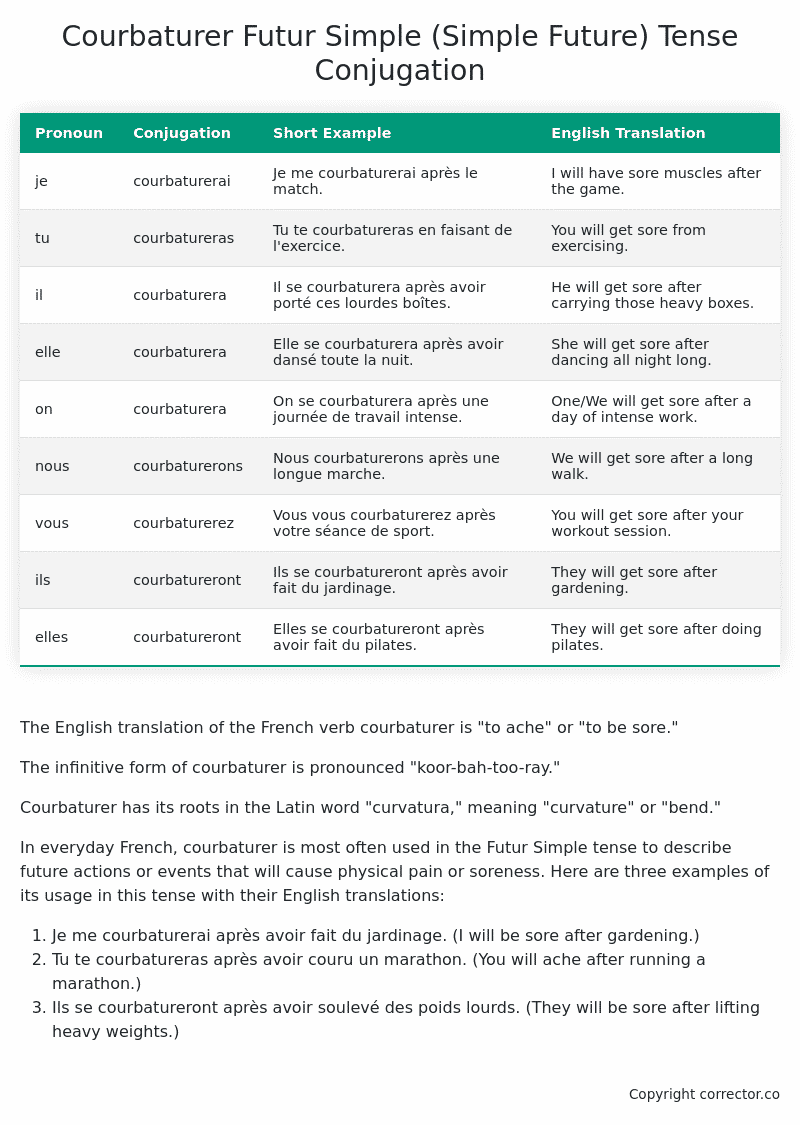Futur Simple (Simple Future) Tense Conjugation of the French Verb courbaturer
Introduction to the verb courbaturer
The English translation of the French verb courbaturer is “to ache” or “to be sore.”
The infinitive form of courbaturer is pronounced “koor-bah-too-ray.”
Courbaturer has its roots in the Latin word “curvatura,” meaning “curvature” or “bend.”
In everyday French, courbaturer is most often used in the Futur Simple tense to describe future actions or events that will cause physical pain or soreness. Here are three examples of its usage in this tense with their English translations:
- Je me courbaturerai après avoir fait du jardinage. (I will be sore after gardening.)
- Tu te courbatureras après avoir couru un marathon. (You will ache after running a marathon.)
- Ils se courbatureront après avoir soulevé des poids lourds. (They will be sore after lifting heavy weights.)
Table of the Futur Simple (Simple Future) Tense Conjugation of courbaturer
| Pronoun | Conjugation | Short Example | English Translation |
|---|---|---|---|
| je | courbaturerai | Je me courbaturerai après le match. | I will have sore muscles after the game. |
| tu | courbatureras | Tu te courbatureras en faisant de l’exercice. | You will get sore from exercising. |
| il | courbaturera | Il se courbaturera après avoir porté ces lourdes boîtes. | He will get sore after carrying those heavy boxes. |
| elle | courbaturera | Elle se courbaturera après avoir dansé toute la nuit. | She will get sore after dancing all night long. |
| on | courbaturera | On se courbaturera après une journée de travail intense. | One/We will get sore after a day of intense work. |
| nous | courbaturerons | Nous courbaturerons après une longue marche. | We will get sore after a long walk. |
| vous | courbaturerez | Vous vous courbaturerez après votre séance de sport. | You will get sore after your workout session. |
| ils | courbatureront | Ils se courbatureront après avoir fait du jardinage. | They will get sore after gardening. |
| elles | courbatureront | Elles se courbatureront après avoir fait du pilates. | They will get sore after doing pilates. |
Other Conjugations for Courbaturer.
Le Present (Present Tense) Conjugation of the French Verb courbaturer
Imparfait (Imperfect) Tense Conjugation of the French Verb courbaturer
Passé Simple (Simple Past) Tense Conjugation of the French Verb courbaturer
Passé Composé (Present Perfect) Tense Conjugation of the French Verb courbaturer
Futur Simple (Simple Future) Tense Conjugation of the French Verb courbaturer (this article)
Futur Proche (Near Future) Tense Conjugation of the French Verb courbaturer
Plus-que-parfait (Pluperfect) Tense Conjugation of the French Verb courbaturer
Passé Antérieur (Past Anterior) Tense Conjugation of the French Verb courbaturer
Futur Antérieur (Future Anterior) Tense Conjugation of the French Verb courbaturer
Subjonctif Présent (Subjunctive Present) Tense Conjugation of the French Verb courbaturer
Subjonctif Passé (Subjunctive Past) Tense Conjugation of the French Verb courbaturer
Subjonctif Imparfait (Subjunctive Imperfect) Tense Conjugation of the French Verb courbaturer
Conditionnel Présent (Conditional Present) Tense Conjugation of the French Verb courbaturer
Conditionnel Passé (Conditional Past) Tense Conjugation of the French Verb courbaturer
L’impératif Présent (Imperative Present) Tense Conjugation of the French Verb courbaturer
L’infinitif Présent (Infinitive Present) Tense Conjugation of the French Verb courbaturer
Struggling with French verbs or the language in general? Why not use our free French Grammar Checker – no registration required!
Get a FREE Download Study Sheet of this Conjugation 🔥
Simply right click the image below, click “save image” and get your free reference for the courbaturer Futur Simple tense conjugation!

Courbaturer – About the French Futur Simple (Simple Future) Tense
Formation of Futur Simple
For regular -er verbs (e.g., parler – to speak)
For regular -ir verbs (e.g., finir – to finish)
For regular -re verbs (e.g., vendre – to sell)
Common Everyday Usage Patterns
Conditional Statements
Interactions with Other Tenses
Futur Antérieur
Conditional
Present
Summary
I hope you enjoyed this article on the verb courbaturer. Still in a learning mood? Check out another TOTALLY random French verb conjugation!


